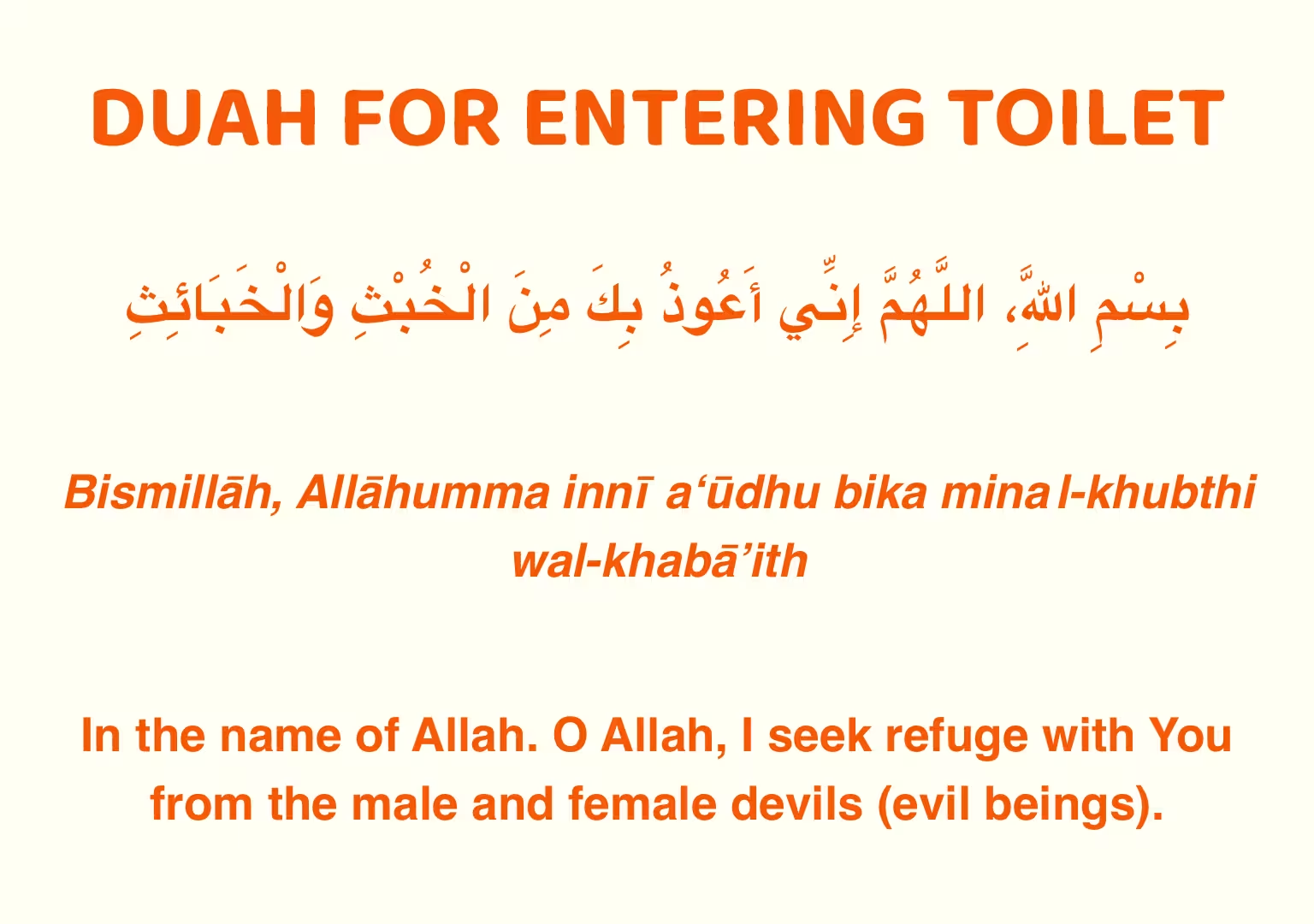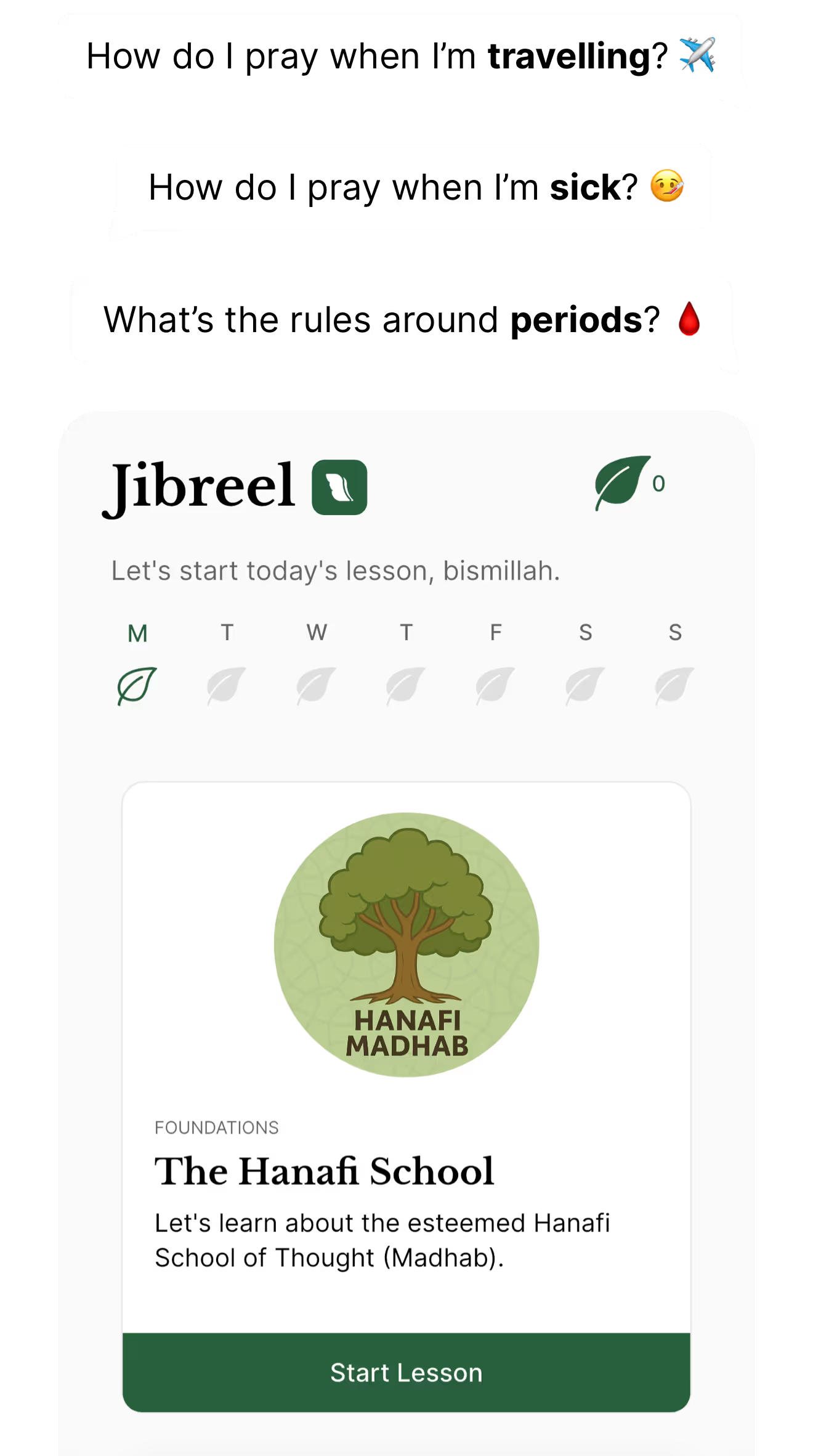What is the Dua Before Entering the Toilet?
The dua before entering the toilet is a short prayer the Prophet Muhammad (ﷺ) encouraged us to say for protection when entering the bathroom.
Anas bin Malik reported that “Whenever the Messenger of Allah entered the toilet, he would say: ‘A‘ūdhu billāhi min al-khubuthi wal-khabā’ith’”.
In other words, the Prophet would seek Allah’s protection from impure or evil influences before relieving himself. It is a Sunnah (Prophetic practice) that Muslims are advised to follow each time they enter a restroom or bathroom.
Arabic Text, Transliteration, and Translation
Arabic: بِسْمِ اللَّهِ، اللَّهُمَّ إِنِّي أَعُوذُ بِكَ مِنَ الْخُبْثِ وَالْخَبَائِثِ
Transliteration: Bismillāh, Allāhumma innī a‘ūdhu bika mina l-khubthi wal-khabā’ith
Translation: “In the name of Allah. O Allah, I seek refuge with You from the male and female devils (evil beings).”
In this supplication, we begin with “Bismillāh” (“In the name of Allah”) and then ask Allah for protection.
The core of the dua “Allāhumma innī a‘ūdhu bika mina l-khubthi wal-khabā’ith” means “O Allah, I seek refuge with You from al-khubth wal-khabā’ith.”
The words al-khubth wal-khabā’ith are often translated as “the male and female devils” or broadly “all kinds of evil impure things”.
Essentially, we are asking Allah to guard us from any evil or harmful entities (such as shayāṭīn, i.e. devils) that lurk in unclean places like toilets.
The dua should recited quietly just before entering the restroom, as a way of remembering Allah and seeking His protection at a time and place where one will be vulnerable and unable to verbally remember Him.
Duahs for Everything
Using the toilet is a routine act, but Islam even provides guidance for such mundane activities.
Prophet Muhammad (peace and blessings be upon him) taught specific duas (supplications) and manners for relieving oneself, highlighting that no aspect of life is outside the remembrance of Allah.
In fact, a disbeliever once mockingly said to Salman al-Farsi (may Allah be pleased with him), “Your Prophet has taught you everything, even how to defecate!” . Salman replied that indeed the Prophet had taught them even this, forbidding practices like facing the Qiblah (direction of prayer) while relieving oneself.
Meaning and Significance of This Dua
Saying the dua before entering the toilet carries important spiritual benefits.
The Prophet ﷺ taught that toilets are places where evil influences may be present: “These toilets are haunted (inhabited by devils), so when any one of you goes to the toilet let him say, ‘A‘ūdhu Billāhi min al-khubthi wal-khabā’ith’” (I seek refuge with Allah from the male and female devils).
By reciting this prayer, a Muslim seeks Allah’s protection from any harmful or impure beings (such as jinn or devils) that might be present in such dirty places.
Islamic scholars explain two main reasons for this practice. Firstly, bathrooms and toilets by their nature are impure places, and impure, evil spirits (devils) tend to frequent these areas.
Secondly, while in the toilet a person avoids verbal remembrance of Allah out of respect, so one’s guard is somewhat lowered; the devil could try to take advantage of this moment. Therefore, the Prophet ﷺ instructed us to seek refuge in Allah before entering, so that Allah’s protection covers us throughout the time in the bathroom.
Shaykh Ibn ‘Uthaymeen, a renowned scholar, said that since the washroom is an “evil and unclean place,” it is appropriate to say this dua when entering “so that no khubth (evil) or khabā’ith (evil spirits) will affect him”. In essence, this dua acts as a spiritual shield, keeping any devils or harmful influences at bay while one is vulnerable.
Another wisdom mentioned by scholars is that saying “Bismillāh” at the start of this dua veils a person’s nakedness from the eyes of the jinn. According to one report, the Prophet ﷺ said: “To say, ‘In the name of Allah’ when one goes to the toilet is to ensure that the jinn cannot see the private parts of humans.” . In other words, invoking Allah’s name creates a barrier of privacy from the unseen beings. Although this particular narration has some weakness, all four schools of Islamic law agree that it is mustaḥabb (recommended) to begin by saying “Bismillah” and then reciting the seeking-refuge dua. Thus, by following this practice, a believer guards both their spiritual and physical privacy.
Overall, the significance of this dua lies in seeking Allah’s help and protection in all matters, even during basic acts like using the toilet. It turns a mundane activity into an act of worship and remembrance. By consciously making this dua, a Muslim maintains a connection to Allah and adheres to the Prophetic example, earning rewards for following the Sunnah while also ensuring safety from any unseen harms.
Hadith References and Authenticity
The dua for entering the toilet is well-established in authentic hadith sources. As mentioned, it is narrated from companions like Anas ibn Malik and Zayd ibn Arqam. Imam al-Bukhari and Imam Muslim both recorded that the Prophet (ﷺ) used to seek refuge with Allah when entering the lavatory.
For example, one hadith in Sahih al-Bukhari (Hadith no. 142) and Sahih Muslim (Hadith no. 375) notes that the Prophet said “Allāhumma innī a‘ūdhu bika min al-khabā’ith…” upon entering the bathroom.
Another narration in Sunan Abi Dawud and Sunan Ibn Majah also confirms this dua, and scholars like Imam al-Nawawi and Ibn Hajar have agreed that the tradition is sahih (authentic).
Hadith scholars have classed this supplication as authentic. In fact, when asked about the authenticity of this dua, one hadith expert replied, “Yes, this du’a is authentic” , referencing the hadith in Fath al-Bari (which is Ibn Hajar’s commentary on Bukhari) under hadith no. 142. Given that it is recorded in multiple reliable collections (Bukhari, Muslim, Abu Dawud, Ibn Majah, etc.), we can be confident that this dua is a confirmed Sunnah of the Prophet ﷺ.
By observing this practice, we are emulating the Prophet’s example. Citing these hadith references not only assures us of the dua’s authenticity, but also reminds us that this simple act carries the weight of prophetic guidance. It is a small but significant sunnah that has been preserved in our rich hadith literature and passed down through generations of Muslims.
How and When to Recite the Bathroom Entry Dua
- Reciting the dua is very simple. One should say it right before entering the toilet or bathroom area, before one starts to relieve oneself. Ideally, you should be at the doorway or just about to enter.
- It’s recommended to enter with your left foot first (as a sign of respect, since the left is used for impure places)
- Recite “Bismillah” followed by the dua silently or in a low voice that only you can hear. The Prophet ﷺ disliked mentioning Allah’s name aloud in dirty places, so we do this supplication briefly and quietly, or even in our heart if we are already inside.
- It’s worth noting that this dua is not only for when you intend to use the toilet. Even if you are entering the bathroom for another reason (for example, to take a shower, to make wudu (ablution), or to clean something), it is still recommended to say the dua upon entering.
- Senior scholars like Shaykh Ibn Baz have emphasized that it is mustaḥabb (desirable) to recite this prayer every time one enters a bathroom, regardless of the purpose. By doing so, you ensure Allah’s protection from any unseen harm each and every time you step into that space.
- If you forget to say it before entering and you are already inside, some scholars mention you can say it in your mind or just say “Bismillah” quietly, but the better practice is to try to remember to say it beforehand.
- Teaching children this habit from a young age is also encouraged – for instance, if a parent takes a small child to the toilet, the parent can say the dua on the child’s behalf to protect them as well.
What is the Dua After Entering the Toilet?
After one has finished and is leaving the toilet, there is another short dua to recite. The Prophet ﷺ taught us to say “Ghufrānaka” (غُفْرَانَكَ) when exiting the bathroom. Ghufranaka means “I seek Your forgiveness.”
This may be understood as seeking Allah’s forgiveness for any human shortcomings, such as being unable to remember Allah verbally while in the toilet.
Aishah (may Allah be pleased with her) said that “When the Prophet exited the toilet, he used to say ‘Ghufrānaka’”.
So, just as we begin by asking Allah’s protection, we end by asking His forgiveness. Remember to step out with your right foot first (the opposite of when you entered) as part of the etiquette.
In summary, to properly observe this Sunnah:
- Before entering: step in with the left foot and quietly say Bismillah and the dua “Allāhumma innī a‘ūdhu bika….”.
- Upon exiting: step out with the right foot and say “Ghufrānaka” (O Allah, Your forgiveness).
By consistently doing this, you not only protect yourself spiritually but also earn reward for following the Prophet’s beautiful example in one of the most private moments of daily life.
Other Islamic Toilet Etiquettes and Manners
In addition to reciting the dua, Islam outlines several toilet etiquettes to maintain cleanliness, modesty, and dignity.
Observing these manners completes the prophetic way of answering the call of nature. Here are some key toilet etiquettes in Islam that every Muslim should be aware of:
- Enter with the Left Foot and Exit with the Right: It is recommended to step into the bathroom with your left foot first and exit with your right foot. This practice is derived from the Prophet’s general preference of using the left side for impure acts and the right side for honorable ones (e.g. we enter the mosque with the right foot and the toilet with the left foot)
- Do Not Face the Qiblah (or Turn Your Back Toward It): When relieving oneself outdoors or in a place without toilets aligned otherwise, one should avoid facing the direction of the Qiblah (the Ka’bah in Makkah) or turning one’s back directly toward it out of respect. The Prophet ﷺ said, “When any one of you sits down to answer the call of nature, he should not face the qiblah or turn his back towards it.”
- If you’re using a built toilet, its direction is usually fixed, but if you have a choice (like in an open field), be mindful of this etiquette.
- Relieve Yourself in a Seated/Squatting Position: The Sunnah is to urinate or defecate while sitting or squatting close to the ground, not standing, because this is more modest and prevents impurity (urine splashes) from getting on your clothes.
- The Prophet ﷺ almost always sat down to relieve himself for these reasons. Standing to urinate is permissible (especially for medical or practical needs), but one must be sure to avoid any splatter. In general, modesty and cleanliness are better preserved when one squats or uses a sitting toilet posture.
- Use the Left Hand for Cleaning (Istinjā’): Islam places great emphasis on hygiene after using the toilet. Use your left hand to cleanse yourself (whether washing with water or wiping), and do not touch your private parts or perform cleaning with your right hand.
- The Prophet ﷺ explicitly instructed, “When any one of you cleans himself, he should not use his right hand. Let him use his left hand for such purposes.” The right hand is generally kept for eating, drinking, and other honorable tasks, while the left is used for removing impurities.
- Maintain Privacy and Modesty: One should conceal their nakedness (awrah) from others’ view while relieving themselves.
- If you are outdoors, go far enough from people or behind a structure or tree to be out of sight. The Prophet ﷺ was very shy and would relieve himself in places where no one could see him. Likewise, do not uncover your private parts until you are close to the ground or ready to sit on the toilet. This protects your dignity and others from discomfort.
- Avoid Speaking and Unnecessary Actions: It is disliked to carry conversations or speak unnecessarily while in the toilet. One should not greet others or respond to greetings in that state. Focus on finishing quickly and quietly.
- Similarly, do not take any item with Allah’s name (like a pendant with Quranic verse) into the toilet if you can avoid it. If you must have your phone and it has Quran apps, keep it in a pocket and don’t play anything out loud. The idea is to avoid mention of Allah’s name or doing anything disrespectful in a place of impurity.
- Cleanse Thoroughly and Wash Hands: After relieving oneself, clean yourself properly using water (preferred) or toilet paper (or other cleaning material) – this cleaning is called istinjā’ (with water) or istijmār (with dry material). Make sure no traces of impurity remain on your body or clothes.
- The Prophet ﷺ warned that many people are punished in the grave for not cleaning themselves after urinating . Thus, take care to wash the private areas well and then wash your hands with soap. Leaving impurities can affect the acceptance of your prayers, so be thorough.
- Say the Exit Dua and Be Thankful: As noted earlier, when you exit, say “Ghufrānaka” (I seek Your forgiveness). This completes the etiquette by acknowledging that we have not spoken Allah’s name inside and asking pardon for any deficiency. It’s also a moment to feel grateful — relief from discomfort is a blessing, and cleanliness is a blessing. Many Muslims also feel gratitude that Allah made such simple natural acts easy and guided us in the best manners for them.
By observing these etiquettes along with the dua, a Muslim turns an ordinary bathroom trip into an act of worship and obedience. These practices ensure physical cleanliness and spiritual mindfulness, which are both highly valued in Islam. The Prophet Muhammad ﷺ said “Purity is half of faith”, and these guidelines help us maintain that purity in a practical way.
References: The above points are drawn from authentic hadiths and scholarly recommendations. For instance, the rules about facing the Qiblah, using the left hand, and concealing oneself are recorded in collections like Bukhari, Muslim, Abu Dawud, and Tirmidhi. The recommendation to enter with the left foot and exit with the right is noted in various Fiqh books and derived from the general Sunnah of the Prophet (PBUH). The importance of cleaning oneself is emphasized in hadiths in Ibn Majah and others.
By learning and practicing the dua before entering the toilet and the related etiquettes, we not only protect ourselves from spiritual and physical harm, but also earn the pleasure of Allah by following the beloved Prophet’s example. Such small acts, done consistently, bring barakah (blessing) into our lives and remind us that no act is too trivial to be done in the remembrance of God.
So the next time you head towards the bathroom, remember to pause and say this short dua – it’s a few seconds of effort that opens the door to Allah’s protection and mercy insha’Allah.
Allah knows best.










